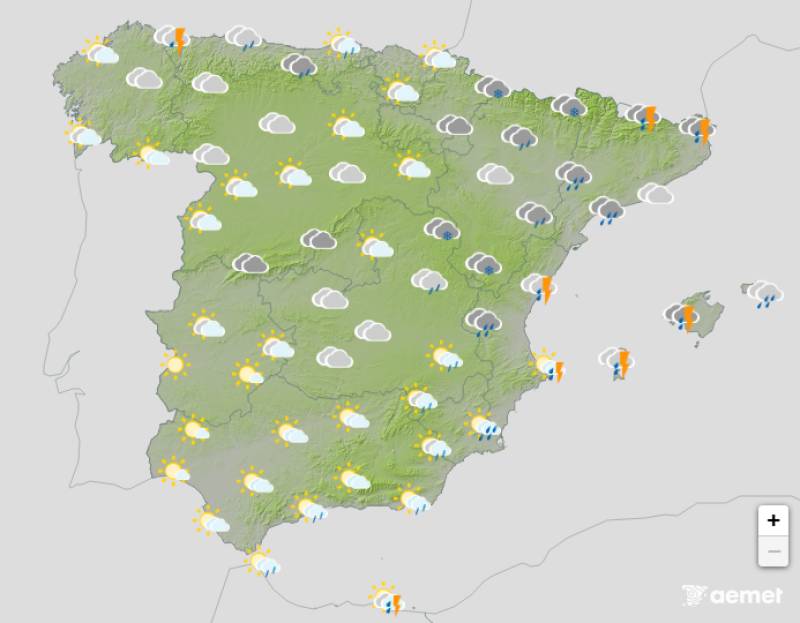- Region
- Águilas
- Alhama de Murcia
- Jumilla
- Lorca
- Los Alcázares
- Mazarrón
- San Javier
-
ALL AREAS & TOWNS
- AREAS
- SOUTH WEST
- MAR MENOR
- MURCIA CITY & CENTRAL
- NORTH & NORTH WEST
- TOWNS
- Abanilla
- Abarán
- Aguilas
- Alamillo
- Alcantarilla
- Aledo
- Alhama de Murcia
- Archena
- Balsicas
- Blanca
- Bolnuevo
- Bullas
- Cañadas del Romero
- Cabo de Palos
- Calasparra
- Camping Bolnuevo
- Campo De Ricote
- Camposol
- Canada De La Lena
- Caravaca de la Cruz
- Cartagena
- Cehegin
- Ceuti
- Cieza
- Condado de Alhama
- Corvera
- Costa Cálida
- Cuevas De Almanzora
- Cuevas de Reyllo
- El Carmoli
- El Mojon
- El Molino (Puerto Lumbreras)
- El Pareton / Cantareros
- El Raso
- El Valle Golf Resort
- Fortuna
- Fuente Alamo
- Hacienda del Alamo Golf Resort
- Hacienda Riquelme Golf Resort
- Isla Plana
- Islas Menores & Mar de Cristal
- Jumilla
- La Azohia
- La Charca
- La Manga Club
- La Manga del Mar Menor
- La Pinilla
- La Puebla
- La Torre
- La Torre Golf Resort
- La Unión
- Las Palas
- Las Ramblas
- Las Ramblas Golf
- Las Torres de Cotillas
- Leiva
- Librilla
- Lo Pagan
- Lo Santiago
- Lorca
- Lorquí
- Los Alcázares
- Los Balcones
- Los Belones
- Los Canovas
- Los Nietos
- Los Perez (Tallante)
- Los Urrutias
- Los Ventorrillos
- Mar De Cristal
- Mar Menor
- Mar Menor Golf Resort
- Mazarrón
- Mazarrón Country Club
- Molina de Segura
- Moratalla
- Mula
- Murcia City
- Murcia Property
- Pareton
- Peraleja Golf Resort
- Perin
- Pilar de la Horadada
- Pinar de Campoverde
- Pinoso
- Playa Honda
- Playa Honda / Playa Paraíso
- Pliego
- Portmán
- Pozo Estrecho
- Puerto de Mazarrón
- Puerto Lumbreras
- Puntas De Calnegre
- Region of Murcia
- Ricote
- Roda Golf Resort
- Roldan
- Roldan and Lo Ferro
- San Javier
- San Pedro del Pinatar
- Santiago de la Ribera
- Sierra Espuña
- Sucina
- Tallante
- Terrazas de la Torre Golf Resort
- Torre Pacheco
- Totana
- What's On Weekly Bulletin
- Yecla


- EDITIONS:
 Spanish News Today
Spanish News Today
 Alicante Today
Alicante Today
 Andalucia Today
Andalucia Today
Date Published: 11/08/2022
ARCHIVED - Workers in Spain earn 20 per cent less than the EU average
The average salary in Spain stood at 1,751 euros a month at the end of 2021

New European labour data has revealed that workers in Spain earn a shocking 20% less than the EU average; 41.7% less than German employees but 58% more than their Portuguese neighbours.
The average salary in Spain at the end of 2021 was 1,751 euros per month, a historic figure, according to the latest report published on Tuesday August 9 by employment and labour agency Adecco. Nevertheless it's still 20.2% lower than the average remuneration in the European Union as a whole, which amounts to 2,194 euros per month.
Basically, more than 20 million Spanish workers earn 443 euros less on average each month, which equates to 5,316 euros per year.
Wage differences remain a main factor in the external competitiveness of national companies, and Spain is actually in an intermediate position in the wage ranking of the 27 EU countries.
There are in fact 15 European countries whose average salaries are lower than Spain's. Wages here rose by 2.6% in 2018 and 2.7% in 2019, but have slid by 0.5% since then.
Adecco's Salary Monitor: Spanish remuneration in the European context', breaks the 27 EU countries into three groups according to the monthly wage.
There are 11 countries in the first group with an average salary of less than 1,100 euros per month.
Amongst them are all the Eastern European EU partners: Bulgaria (562 euros), Romania (718 euros), Hungary (798 euros), Poland (833 euros), Croatia (863 euros), Latvia (892 euros), Slovakia (977 euros), Lithuania (1,007 euros), Greece (1,034 euros), Estonia (1,053 euros) and the Czech Republic (1,078 euros). Despite being included in the same group, there are notable differences between the countries; the average wage in the Czech Republic is almost double that of Bulgaria.
There are seven countries with an average wage of more than 1,100 euros, but less than 2,500, which make up the group with intermediate salaries.
In addition to Spain, with 1,751 euros, this group includes: Portugal (1,106 euros), Cyprus (1,309 euros), Malta (1,329 euros), Slovenia (1,417 euros), Italy (2,074 euros) and France (2,446 euros). Again, there are wide differences: the average wage in France is twice as high as in Portugal.
Finally, a group of nine countries enjoy average pay packets of more than 2,500 euros per month. These are: Finland (2,603 euros), Sweden (2,623 euros), Austria (2,788 euros), Belgium (2,830 euros), the Netherlands (2,883 euros), Ireland (2,920 euros), Germany (3,003 euros), Denmark (3,458 euros) and Luxembourg (3,502 euros). This group is more homogeneous than the previous two, as the maximum difference is less than 35%.
According to Adecco, the above data clearly demonstrates that within the EU there are countries where the average wage is more than six times higher than the average salaries of others.
The extreme case arises when comparing the average remuneration in Luxembourg (3,502 euros/month) and Bulgaria (562 euros/month), which are separated by a gap of 2,940 euros per month. In a single month, an average Luxembourg worker earns the same as a Bulgarian colleague in more than six months.
However, the disparity between the different European salaries has been narrowing every year since at least 2010, when the highest salary (which at that time was 2,900 euros, also in Luxembourg) was 11 times higher than the lowest (265 euros in Bulgaria).
In Spain's case, its current situation on the wage table is clearly advantageous compared to Eastern European countries, but unfavourable compared to the most advanced EU countries.
Now read: August 15 is a public holiday in Spain: everything you need to know abut the summer puente
Image: Archive
Loading
Sign up for the Spanish News Today Editors Roundup Weekly Bulletin and get an email with all the week’s news straight to your inbox
Special offer: Subscribe now for 25% off (36.95 euros for 48 Bulletins)
OR
you can sign up to our FREE weekly roundup!
Read some of our recent bulletins:
Discount Special Offer subscription:
36.95€ for 48 Editor’s Weekly News Roundup bulletins!
Please CLICK THE BUTTON to subscribe.
(List price 3 months 12 Bulletins)
Read more stories from around Spain:
Find more information by AREA, TOWN or URBANISATION .....
Cabo de Palos
Cartagena
El Carmoli
Islas Menores and Mar de Cristal
La Manga Club
La Manga del Mar Menor
La Puebla
La Torre Golf Resort
La Union
Los Alcazares
Los Belones
Los Nietos
Los Urrutias
Mar Menor Golf Resort
Pilar de la Horadada
Playa Honda / Playa Paraiso
Portman
Roldan and Lo Ferro
San Javier
San Pedro del Pinatar
Santa Rosalia Lake and Life resort
Terrazas de la Torre Golf Resort
Torre Pacheco
Cartagena
El Carmoli
Islas Menores and Mar de Cristal
La Manga Club
La Manga del Mar Menor
La Puebla
La Torre Golf Resort
La Union
Los Alcazares
Los Belones
Los Nietos
Los Urrutias
Mar Menor Golf Resort
Pilar de la Horadada
Playa Honda / Playa Paraiso
Portman
Roldan and Lo Ferro
San Javier
San Pedro del Pinatar
Santa Rosalia Lake and Life resort
Terrazas de la Torre Golf Resort
Torre Pacheco
Aguilas
Aledo
Alhama de Murcia
Bolnuevo
Camposol
Condado de Alhama
Fuente Alamo
Hacienda del Alamo Golf Resort
Lorca
Mazarron
Puerto de Mazarron
Puerto Lumbreras
Sierra Espuna
Totana
Aledo
Alhama de Murcia
Bolnuevo
Camposol
Condado de Alhama
Fuente Alamo
Hacienda del Alamo Golf Resort
Lorca
Mazarron
Puerto de Mazarron
Puerto Lumbreras
Sierra Espuna
Totana
Abanilla
Abaran
Alcantarilla
Archena
Blanca
Corvera
El Valle Golf Resort
Hacienda Riquelme Golf Resort
Lorqui
Molina de Segura
Mosa Trajectum
Murcia City
Peraleja Golf Resort
Ricote
Sucina
Abaran
Alcantarilla
Archena
Blanca
Corvera
El Valle Golf Resort
Hacienda Riquelme Golf Resort
Lorqui
Molina de Segura
Mosa Trajectum
Murcia City
Peraleja Golf Resort
Ricote
Sucina
Urbanisations
CamposolCondado de Alhama
El Valle Golf Resort
Hacienda del Alamo Golf Resort
Hacienda Riquelme Golf Resort
Islas Menores and Mar de Cristal
La Manga Club
La Torre Golf Resort
Mar Menor Golf Resort
Mazarron Country Club
Mosa Trajectum
Peraleja Golf Resort
Santa Rosalia Lake and Life resort
Terrazas de la Torre Golf Resort
La Zenia
Lomas de Cabo Roig

Important Topics:
CAMPOSOL TODAY Whats OnCartagena SpainCoronavirusCorvera Airport MurciaMurcia Gota Fria 2019Murcia property news generic threadWeekly Bulletin
CAMPOSOL TODAY Whats OnCartagena SpainCoronavirusCorvera Airport MurciaMurcia Gota Fria 2019Murcia property news generic threadWeekly Bulletin
Contact Murcia Today: Editorial 000 000 000 /
Office 000 000 000
























